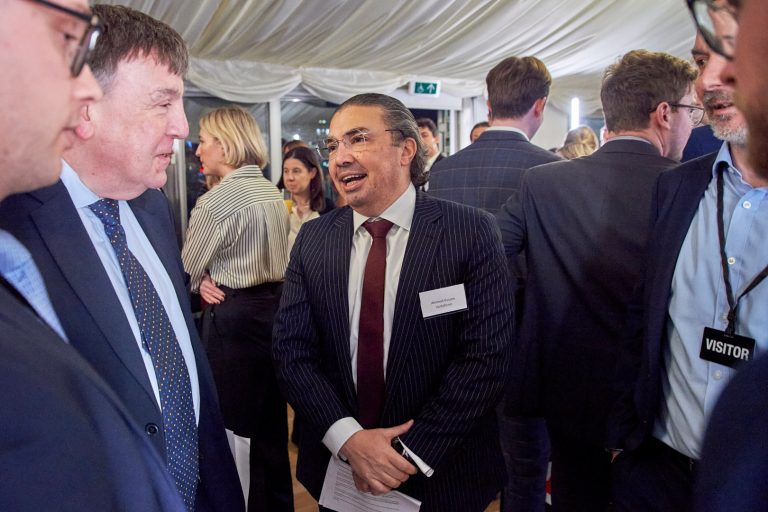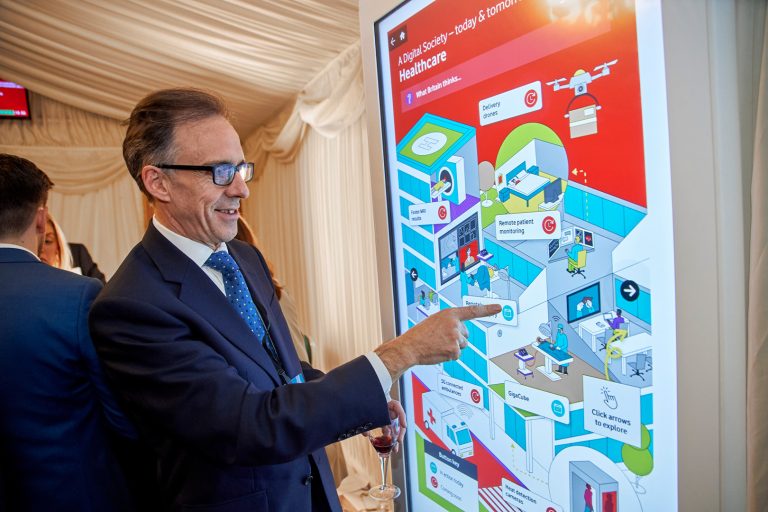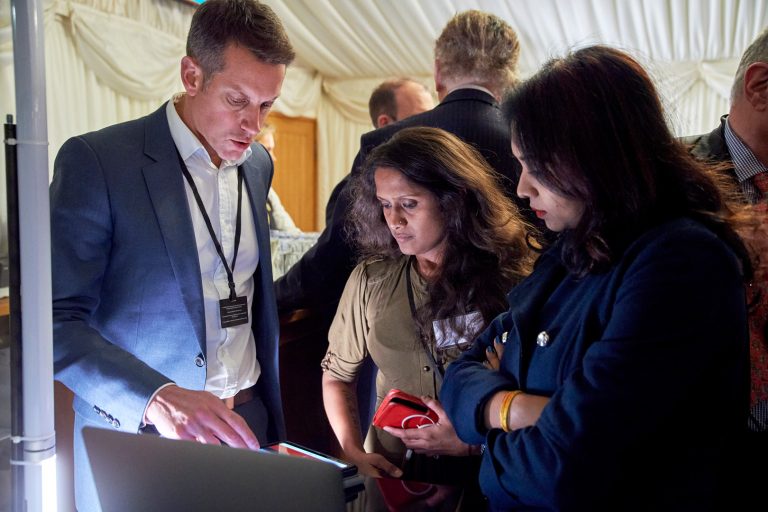Delivering the speedy rollout of 5G Standalone across the country could be worth as much as £7.4bn in additional economic value by 2030 compared to a slower rollout, according to research from Vodafone.
- The difference between slow and accelerated 5G rollout worth an additional £7.4 billion to UK economy
- Speedy roll out of 5G could deliver £1 billion of savings in the NHS, cut rail journey times, saving passengers 25 million hours in travel time over the next five years and reduce streetlight carbon emissions by one million tonnes
- 5G rollout risks exacerbating economic inequality without a more competitive and consolidated mobile market

Credits: Vodafone
5G Standalone coverage in all populated areas by 2030 is a core ambition of the Government’s Wireless Infrastructure Strategy. However, according to economic modelling commissioned by Vodafone UK and conducted by WPI Economics, there is a significant difference between slow and rapid rollout of 5G Standalone.
Ahmed Essam, CEO of Vodafone UK, said: “Speed matters when it comes to the availability of the most technologically advanced digital networks.
“Digital technology has the potential to transform the way we live, work and access vital public services. The faster we can make these opportunities available to customers, the greater the overall impact to the UK.
“We’ve already begun, but the proposed combination with Three UK will mean we have the scale to accelerate investment to bring benefits to businesses and consumers sooner rather than later. We have committed to £11bn of investment to deliver 5G Standalone across the UK.”
Minister for Data and Digital Infrastructure, Sir John Whittingdale, said: “In our increasingly connected digital world, access to high-speed, reliable connectivity has become an essential part of everyday life.
“This research shows exactly why we’ve made rolling out high-speed connectivity a top priority – bringing lightning-fast internet to every corner of the UK will help transform our communities by injecting more than £7bn into our tech-driven economy by the end of the decade”.

Credits: Vodafone
In comparison to a sluggish deployment of 5G Standalone, the benefits of an accelerated rollout are particularly high in regions such as the South East, which could see an additional £790 million by 2030, or the East Midlands with an additional £310 million by 2030 – with these same regions also having the most to lose under a delayed rollout.
Regions such as the South West and the North West are also set to realise an additional £425 million and £235 million respectively in terms of economic benefit by 2030 as a result of 5G Standalone. Indeed, every region surveyed experienced significant economic returns when modelled as a good investment environment, whilst all are set to lose when benchmarked against a poor investment environment.
Previous research by Vodafone UK found that if rural communities had the same 5G coverage as urban areas, 838,000 more people would have some access to 5G, where none currently exists. The efficient rollout of 5G networks can therefore be a key contributor to Levelling Up and removing the rural digital divide.

Credits: Vodafone
However, the report goes on to argue that these applications will not materialise without a more consolidated mobile market. Vodafone’s proposed merger with Three UK would increase capacity by 75% by 2028, enabling the new combined entity to commit to investing over £11bn in the UK’s 5G network by 2034, delivering £5bn per year in economic benefit by 2030.
The research underlines the importance of the combined Vodafone/Three UK network which will reach more than 99% population coverage with a 5G Standalone network by 2034, and over 95% population coverage by 2030, in full support of the Government’s Wireless Infrastructure Strategy ambitions for nationwide coverage of 5G Standalone in all populated areas by 2030.
Merger of Vodafone UK and Three UK to create one of Europe's leading 5G networks
Vodafone Group and CH Hutchison Group Telecom Holdings Ltd., owner of Three UK, have agreed to combine their UK businesses.
5G Standalone infrastructure has the potential to transform the way people access public services, cut rail journey times and help reduce carbon emissions. Key findings in the report demonstrate how 5G could deliver tangible benefits to people right across the country, including:
- Higher quality remote 5G-enabled check-ups and patient monitoring will reduce the need for GP and hospital visits, resulting in £1 billion of NHS savings per year – savings which could cover the equivalent of 15,400 new full-time nursing posts.
- Installing 5G-enabled sensors, which detect problems on railways and trains, would reduce delays and cancellations, saving passengers more than 25 million hours over five years. That time saved for passengers is worth £326 million in productivity and wellbeing benefits. This aligns with recent industry findings which note that the virtual coupling of trains enabled by 5G could provide a 43% reduction in train separation distances, allowing for a marked increase in the number of services offered, without other upgrades to legacy infrastructure having to be considered.
- 5G-powered smart city lights, which detect movement to turn on or dim street lighting, could save local councils £700 million over the next five years. They could also reduce emissions by one million tonnes of CO2 – the equivalent of replacing 250,000 petrol or diesel cars with electric.
You can access the full 5G: Building a Digital Society report for more detail.
Stay up-to-date with the very latest news from Vodafone by following us on Twitter and LinkedIn and signing up for News Centre website notifications.
-Ends-
Economic modelling methodology
The 5G rollout modelling by WPI Economics combines estimates of the productivity and economic growth benefits of 5G. It draws on a range of studies to estimate an average benefit, with evidence drawn from the regional rollout of the 4G network. The 5G rollout scenarios are informed by the differing speeds of 4G rollout across UK regions. When compared against a baseline case in which the rollout of 5G Standalone broadly matches the rollout profile of the 4G network in the UK, in terms of both overall coverage and distribution of coverage across the country. A slower 5G rollout would deliver a loss of over £4.6 billion by 2030, whereas an accelerated rollout of 5G Standalone 5G infrastructure delivers an additional £2.8 billion to the UK economy by 2030.
The 5G case study analysis draws on a wide range of publicly available data sources and studies, to estimate impacts of specific 5G use cases – including DfT Passenger Charter, LGA Revenue Data and HM Treasury Expenditure Analysis. The methodology also draws on official government guidelines (such as DfT’s TAG book) and well-documented case studies (such as the Liverpool 5G testbed). All modelling figures have undergone a rigorous quality assurance process.
Headline findings
5G Rail
- Using 5G-enabled sensors on rail infrastructure can improve the efficiency of track maintenance and reduce the rate of fault incidence.
- Analysis by WPI Economics finds that this could save passengers more than 25 million hours over 5 years – valued at £325 million – increasing productivity and wellbeing.
- WPI estimate that fewer delays and cancellations could save train operating companies around £20 million every 5 years in compensation paid out to customers, money which could be used to drive better services.
- 5G train-to-train communication will allow ‘virtual coupling’ of trains, which allows for more services due to a reduction of 43% of the needed separation between trains on the track.
- This will provide a reduction in overcrowded peak-hour trains, boosting productivity and wellbeing.
5G Social Care
- 5G-powered health and social support would enable patient care to be done remotely. Those in need of care could be supported via high quality, high-speed video connection, which would allow for more – and higher quality – remote care.
- Based on information from early trials, WPI analysis finds that the NHS could save up to one billion pounds a year if the 5G support was rolled out nationwide – equivalent to 15,400 full time nursing posts. Between 2023 and 2038, the benefits could reach £17.5bn.
- Benefits extend beyond cost savings: WPI estimates that the quality-of-life improvements associated with installing 5G-powered social care technologies could be worth £1.4bn – a figure that is due to grow as the population ages.
5G Connected Streetlights
- WPI analysis finds that 5G-powered smart city lights could reduce energy usage, save money and reduce emissions: councils could save £700m over the next 5 years, while emissions could be reduced by one million tonnes of CO2 – equivalent to replacing 250,000 petrol or diesel cars with electric.
- They could also reduce light pollution, improve well-being (lower depression and insomnia rates), help nocturnal animals, and allow for better data collection given lights are fitted with sensors which could improve urban planning without compromising safety







![Happy friends cheering [Adobe Stock]](https://www.vodafone.co.uk/newscentre/app/uploads/2024/07/Happy-friends-cheering-Adobe-Stock.jpg)